
Close

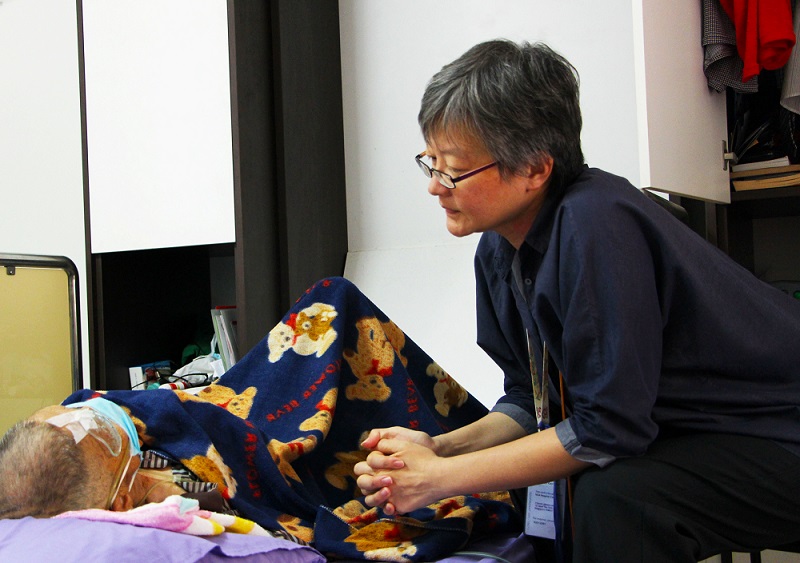
“We have a patient in distress. Let’s leave in five,” informs Jacqueline Ang, HCA Hospice (HCA) Senior Medical Social Worker (MSW). Within minutes she prepares her patient’s file before dashing out the main door.
This is a typical day for MSW Jacqueline Ang, whose patients affectionately address as “Ang Ku Kueh”.
“What does dignity mean to my patients at the end of their life?” This is a question that constantly guides Jacqueline as she visits her patients. “Does giving dignity to a patient mean dying a comfortable death? Or is it allowing them to decide how their last few months, days, or even hours, are to be lived?”
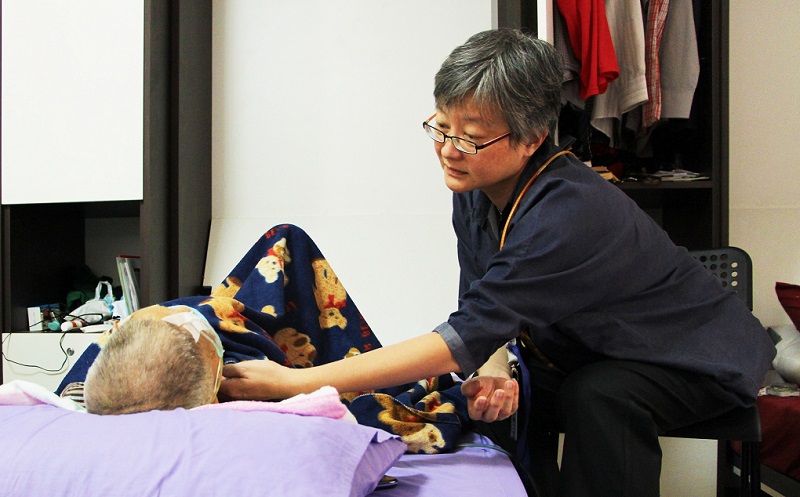
A look of concern on Jacqueline’s face as she checks Mr Chua’s temperature
As she enters the one-room flat, Jacqueline notices a small, frail elderly man on his bed, covered in a thick blanket. Mr Chua* has a plastic patch over his right eye and is running a fever.
Mr Chua is visibly upset as his medication is depleted and is unable to get a prescription from the hospital. The medication, which reduces the signs and symptoms of inflammatory conditions, helps relieve his breathlessness and discomfort. It enables him to go out for short periods of time for fresh air at the void deck. It permits him the freedom that his illness has restricted.
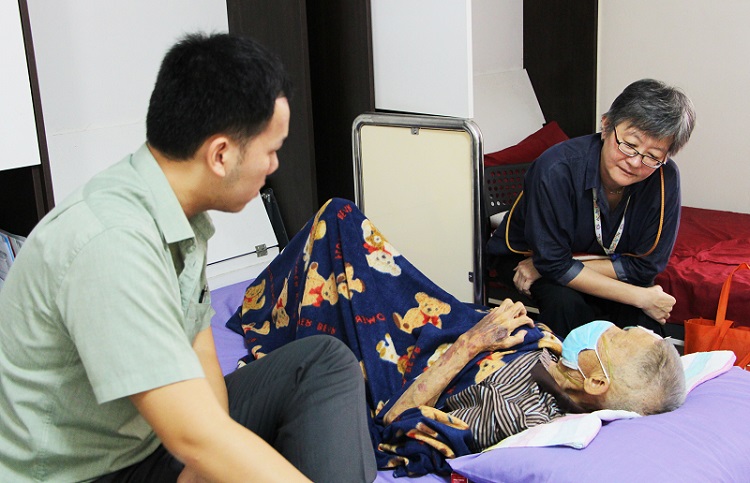
Medical social workers Tan Say Haow and Jacqueline Ang listen intently to Mr Chua’s fears and concerns
However, there are side effects to this medication, of which he has begun to experience – cataract, high blood sugar, increased risk of infections, thinning of the skin, osteoporosis and the list goes on. The negative effects are as many as the benefits.
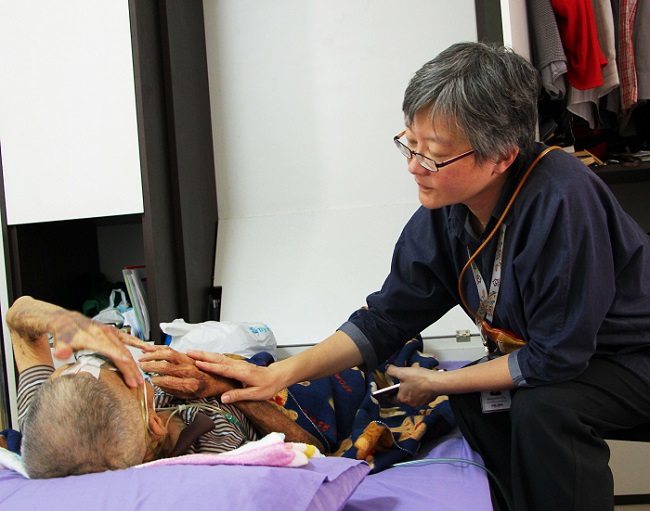
An assuring touch is more than words can console
“This medication has quite strong side effects,” Jacqueline explains to Mr Chua.
“I know! Now there is no cure for me. All I ask is to be comfortable,” he exhales in exasperation and helplessness.
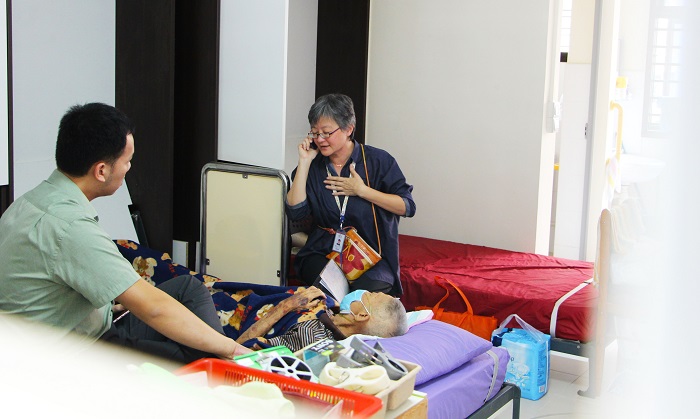
Jacqueline speaks with Mr Chua’s doctor on the phone to clarify the situation
In a fit of anger, he calls his eye surgeon to cancel his cataract operation. Jacqueline swiftly calms Mr Chua down and requests to speak with the medical staff. Having explained his pain and dying wishes, she proceeds to make the necessary arrangements with his hospital doctor.
Later, Mr Chua shares his hope to be able to visit his cat, Bobo, at Changi whom he misses dearly. A fiercely independent man, the loss of his mobility also meant a decrease in his quality of life.
Jacqueline shares, “What we see and think is best for our patients may not necessarily be so.” Difficult decisions like these are an integral part of Jacqueline’s work. “I struggle with this ongoing moral dilemma. Do we deny the man what would give him comfort and his dignity to make his own choices in favour of what would preserve his life for a few moments more?”
“So, when will you bring us to see Bobo?” Jacqueline asks. A glimmer of hope sparkled in Mr Chua’s eyes, but it quickly fades away. “I do not know, maybe when I have more energy to go out and walk.” Jacqueline assures him that he will receive the medication first thing next week and humbly apologises for the discomfort he has to suffer until then.
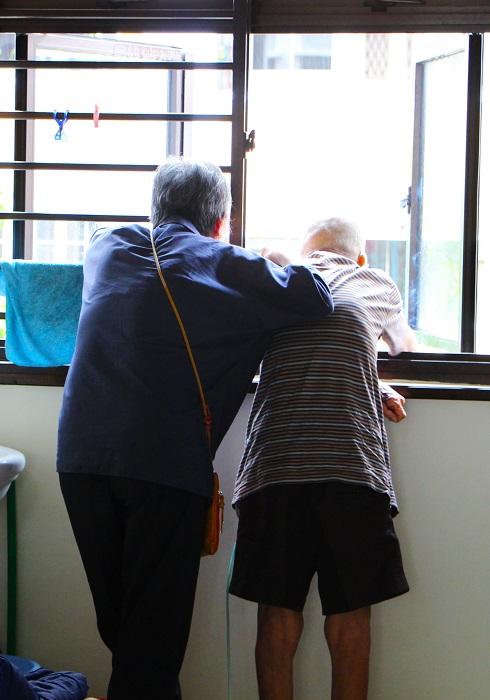
Journeying with a friend
“Not by our perimeters, but by our patients”, reminds Jacqueline.
Evidently, being a Medical Social Worker is more than filling in reports and applying for social aid. It is being a friend who journeys with her patients without judgement. She fights alongside with them to add life to their days and help them find meaning in their remaining days.
She walks this journey with them – a journey of love.
*Not their real names